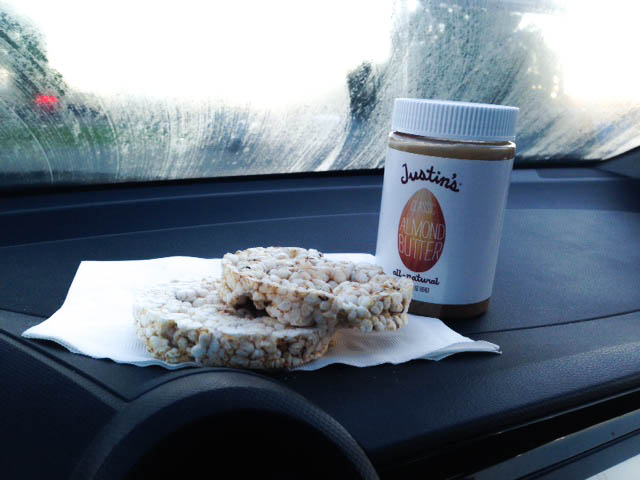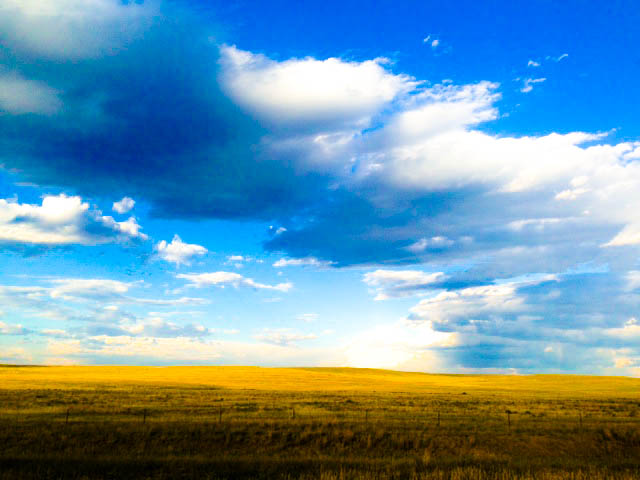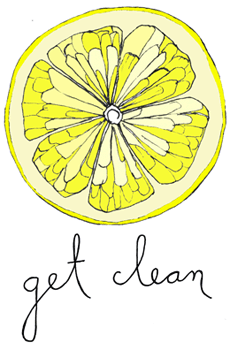About a year ago, one of my Holistic Health Coaching clients asked me for advice on how to stay healthy while she spent 5 days driving across the country. She was nervous about the negative impact of sitting for so many hours each day, not having much of a chance for exercise, and the perils of road food. Over the years I have traversed the great expanse of our country many times. At times I’ve done it quickly out of imperative, while other trips have been more meandering. Most recently, I took 11 days to drive from the coast of Maine to the mountains of California. It was my first cross country trip alone and I wondered how I would fare, energy-wise, with no co-pilot to relieve me. It ended up being one of my favorite drives yet. I was lucky enough to have friends to stay with along the way and I never logged more than an 800 mile day (and only one of those at that). No matter how you slice it, sitting for hours on end–whether in a car, a bus, on a plane or at a desk–just isn’t great for your body, or your brain. That said, at no point in my trip did I feel particularly beat up by my time behind the wheel which I attribute to the following tricks I have picked up over the years.
1. HYDRATE: Yes, it may seem very inconvenient to have to pee every 2 hours while trying to cover hundreds of miles by car in a day. However, needing to pee means getting off the road for even just a few minutes. You have a chance to stand up, stretch your legs, use your muscles, change your body position, and, perhaps most importantly, re-awaken your brain to keep you alert. Staying alert and awake will do more for your progress on the road than saving yourself a couple of extra exits from the highway. It’s also safer. An added bonus to hydrating? You won’t have swollen feet and joints at the end of the drive.
2. PACK SNACKS: I won’t lie. This part takes some preparation. But when faced with an endless stream of fast food or gas station options and little else on the road, the small amount of extra time has huge rewards. Take an extra half hour before you leave for your trip or get back on the road after a night’s rest, to go to a grocery store and stock up on road food. Go for nourishing whole foods over processed snack foods as much as possible. You can often find a grocery store within reasonable distance from a major highway so you can restock along the way. Better still, if you have some time to explore, do a quick internet search of farmers markets along your route and plan a visit into your itinerary. If you have leftovers from a home cooked meal, bring them along. You’ll likely be happy to have the reuseable container with you as well. My small road cooler always has the following
- crunchy vegetables that are full of water and take some real chewing. Celery, cabbage, romaine lettuce, cucumber, bell peppers. They are easy to eat with one hand, full of nutrients, hard to over-snack on, and delicious on their own or dipped in hummus.
- fresh fruit–seasonal when available but at the very least I know I can find apples at just about any grocery store. The natural sugar is a good source of energy for long hauls
- dark chocolate & KIND bars for when that sweet tooth hits
- hummus and rice crackers (usually Mary’s Gone Crackers as well as Lundberg Rice Cakes). Good crunch factor and a little salty but not nearly as sodium packed as a bag of chips
- homemade trail mix–whatever looks good in the bulk section of a grocery store but try to steer clear of overly salted or sweetened nuts and dried fruits. My favorite combination is raw almonds, pumpkin seeds, sunflower seeds and unsweetened dried cranberries. If you have a tendency towards mindless snacking, portion your mix out into single serving plastic bags or containers
- all natural jerky–beef, bison, turkey, salmon–whatever you’re into. Savory, satisfying and full of lean protein
- hard boiled eggs–if you don’t have somewhere to boil eggs along the way you can usually find pre-peeled boiled eggs in the salad bar section of larger grocery stores. This is a perfect, protein packed, easy to eat snack
- nut butter–eat it by the spoon full, put it on your apple, dip your celery sticks into the jar
- organic soup or broth cartons–this is a meal you can easily eat/drink while mobile or have at room temperature at a rest stop or in your hotel room. Since your metabolism might be less active than usual it’s a nice lower calorie way to get a nourishing meal on the road that is light on your digestive system as well.
- avocado–one of the best anywhere, anytime snacks
- canned fish. tuna, salmon, sardines–whatever you like just make sure it’s a pull top if you don’t carry a can opener with you. Scoop the fish into half an avocado and eat with a spoon at a rest stop for a quick meal.
- green or black tea and stimulating herbal teas like peppermint and ginger. I keep a few bags of each with me and fill my thermos or empty paper coffee cup with hot water at gas stations. A good way to mediate your caffeine intake instead of guzzling gas station coffee all day. Saves you money too.
- a metal food container (Lunchbots makes good ones), a metal water bottle, a spoon, a fork, and an Opinel folding picnic knife
3. EAT SMALL AMOUNTS OFTEN: One of the biggest mistakes people make on the road is stopping (or driving through) to eat a big meal at a fast food or greasy spoon restaurant. These meals are often high in calories, high in fat, high in sodium, high in hidden sugars, and made with processed and low quality ingredients. They can leave you feeling sluggish, heavy, and tired (“food coma”), not to mention the spike they cause in your insulin levels and the subsequent crash you feel later (read fatigue, headaches, sugar and caffeine cravings). Whether you packed your snacks or are eating road food, eat small amounts often, keeping your body energized, your brain alert, and your digestive system functioning at its optimal level. This may mean you find yourself eating at very regular intervals–more than you might at home or at work.
If you’re worried about mindless snacking, keep your food in the backseat and when you stop for gas or a rest, pull out one or two things at a time to have within arms reach. If you really need to take a break, go to a rest stop (some of them are actually quite lovely), and have a small picnic of your provisions before getting going again. You will save money eating your own food, you will save some time, and you will save your body from the discomfort of trying to digest a gut bomb of a roadside meal at a time when you are likely more sedentary than usual.
4. MAKE TIME TO MOVE: There is no space too small for a little movement. Well, few spaces too small. My point is, even small bursts of movement are useful and possible when on the road. On family road trips, growing up, my Mom used to require us to do 25 jumping jacks at each rest stop to use up some of our restless energy and to get the blood flowing. Recently, I saw a young woman at a rest stop hula hooping. In Indiana I found enough space on a concrete platform holding a picnic table to stretch and do a few sun salutations. It took me about 8 minutes and I felt looser and more awake for having done so.
You can keep it simple. Park as far from the bathroom or the store entrance or the hotel lobby as you can. Pack a yoga mat or a towel in your car and pull it out in your hotel room, your friend’s house, or a public park. You don’t need to do a full practice or a full workout. Even stretching will help. Every little bit of movement helps to keep your circulatory and lymphatic systems moving. Completely exhausted at the end of the drive? Lie down on your bed or on a towel on the floor and put your legs up the wall to reverse the flow of blood, draining it from your feet and sending new blood flow to the brain. This is great for calming the nervous system and I recommend doing it after any long day, whether you’re traveling or not.
Lastly, rest when you need to. This isn’t a tip so much as common sense. Driving across the country, or any long distance, inevitably requires some flexibility. You never know what the road conditions will be or how you will feel. Like any other time in your life, no two days are exactly the same. Being well rested is incredibly important for your safety on the road and the safety of your fellow travelers. And who knows, by taking an unexpected break in a town you’ve never heard of, you may stumble upon something magnificent.
Do you have tips of your own for healthy travel? I’d love to hear them so please share in the comments section. Happy trails!




 Subscribe via RSS
Subscribe via RSS